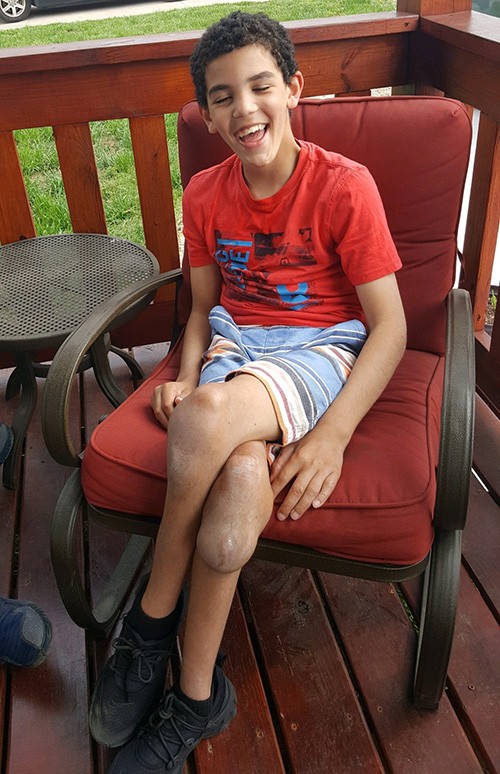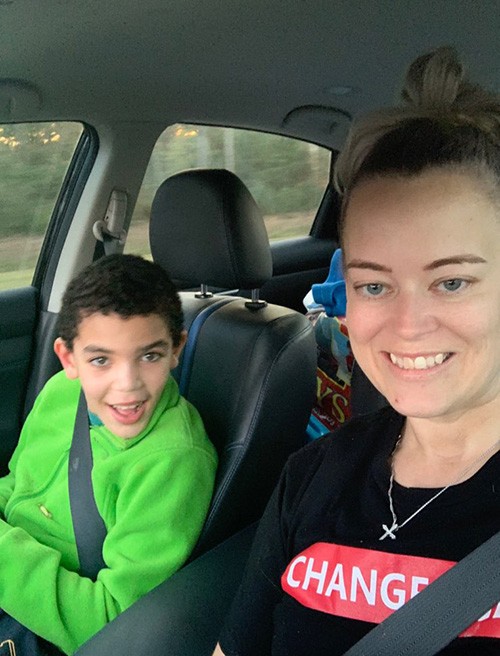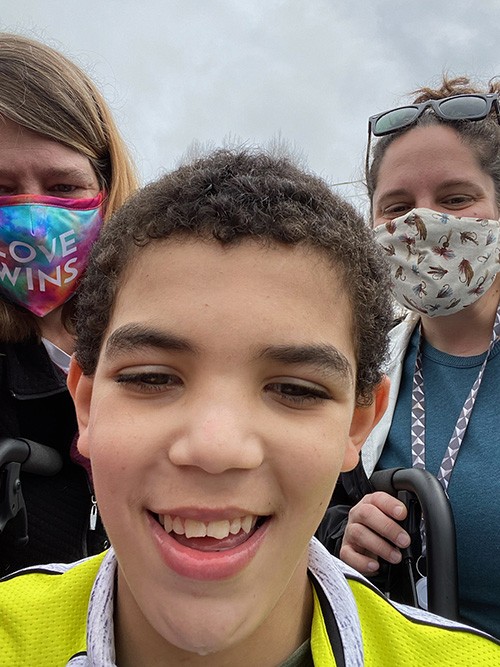
“When you have a kid with a lot of medical issues and high behavioral needs, it’s hard to always hear the negative,” said Ashley, transition coordination supervisor at Vaya Health and mother to Maddox, a Vaya member with an intellectual and/or developmental disability. “You always have that fear that it’s not going to work out.”
But things did work out for Ashley and Maddox thanks to the Vaya Olmstead team. Although Ashley is a Vaya employee, she strives to keep her professional work out of her personal family life. The Olmstead team treated her as they would any other member and worked to come up with solutions no matter how many roadblocks they faced. When Ashley had fears and worries when it seemed like no community placement would take Maddox, they helped keep her calm.
“My son doesn’t fit the mold,” said Ashley. “What helped so much is their knowledge, patience and willingness to navigate barriers. They helped me to stay positive, and if there was a barrier, we worked around it. It just shows how they are there for members and they don’t give up.”
Maddox is nonverbal and has an extremely rare and progressive genetic disorder, one of about a dozen known cases in the world, which adds to the complexity of his care. As a single mother, Ashley made the decision to enter him into an intermediate care facility (ICF) since there were not enough supports at home for him and his sibling that also needed additional care.
Unfortunately, the facility was over six hours away and during the pandemic, there was a time of nearly six months that Ashley had to go without seeing Maddox. When he first went into the facility, he was active and able to run and walk. The next time Ashley saw him, the disorder had left him unable to move from a crouch position. It was incredibly difficult for Ashley to see such a drastic transition in her own child and she wanted to find a place closer to home so she could be with him more often.
Vaya’s Olmstead team is typically challenged in convincing families to consider community placement because of fear that the member will end up unhappy or hurt or that there is no reason to make a change from the ICF that they’ve lived in for years. While other organizations may not push any further once they hear that from the family, Vaya takes the extra steps to continue with education, information and support which leads to a higher success rate.
“We do a really good job in the front end of the placement process by thoroughly reviewing and discussing options with the families in the beginning to see if community placement is an option,” said Jen Branham, Olmstead diversion manager at Vaya. “In 2019, we spent the least amount of our Medicaid budget on ICFs and had the fewest number of people under Memorandum of Agreements in state developmental centers than any other managed care organization in the state.”

Although authorities would use COVID-19 as an excuse to put positive changes on hold during the pandemic, Olmstead Care Manager Michelle Cates never gave up. They didn’t let Ashley give up hope either, even when things became worse for Maddox. He struggled at the facility as one of over 100 members and had a few frightening altercations that left him not wanting to be there. During one of the visits, Ashley was able to take him out for a couple of hours to spend some time with him but was heartbroken when she brought him back.
“When I tried to take him back to the facility, he was screaming and crying,” said Ashley. “He refused to push his wheelchair and I had to force him inside. It was devastating.”
Michelle continued to search for another home that would be better suited for Maddox and closer to Ashley. What they found was a three-bed home that is fully handicap accessible and able to meet his needs – all within a 45-minute drive. They also found a wheelchair for Maddox when he was discharged from the facility without one and connected him to the services that he needed.

“Michelle and the whole Olmstead team did everything,” said Ashley. “They helped locate the home and were also supports and advocates in navigating the system to make sure all the pieces were in place. They’ve done everything for me so that he has what he needs and worked with the state in finding him a home. They found the perfect home for him – It was the perfect fit.”
The smaller, family setting has done wonders for Maddox. Now, he’s happy and ready to go when Ashley drops him back off after a visit. His independence and verbal skills are flourishing. He’s even able to ask for things or say what he wants or doesn’t want. Now that Maddox is out in the community, he’s also able to receive physical therapy. His physical therapist is able to get the equipment Maddox needs to increase his independence and is working on getting him standing.
“It’s like night and day,” said Ashley. “His provider understands him, and the agency has done an amazing job training. They’re very patient with him. Maddox just has this huge smile on his face, and I can sleep at night.”
Maddox also found something else at his new home: a peer. Ashley had never seen him interact or engage with another child, but he’s now formed a friendship and has someone to play with daily.
“I appreciate the Vaya staff and my son’s team,” said Ashley. “They were able to handle everything for me and just let me be mom. I’m really thankful for that.”



